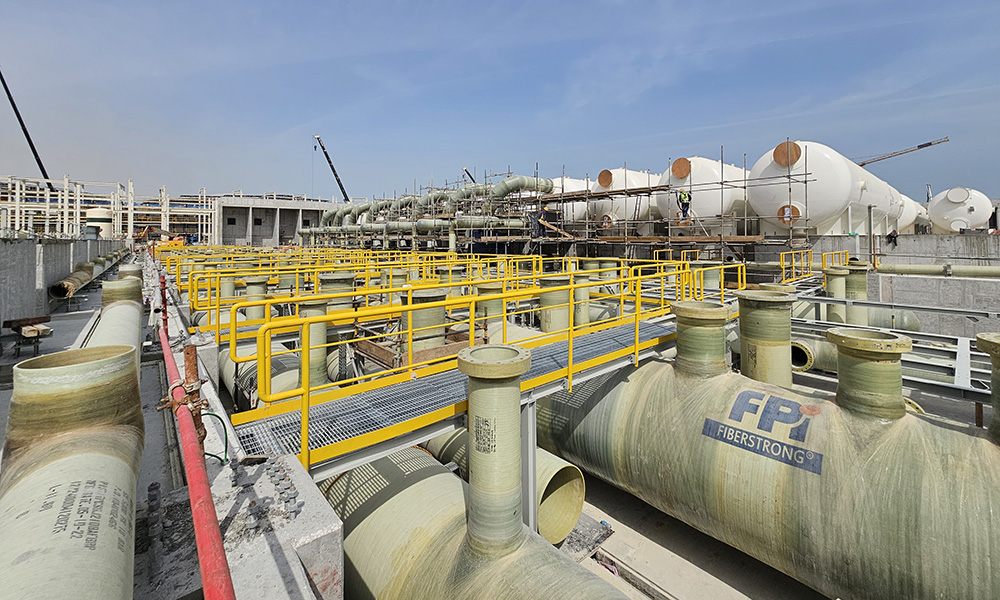Women in Construction profile – ACCIONA’s Adelaida Fernandez
Due to the lack of women in the industry, many women don’t think that the construction industry might be a professional opportunity for them, and this is where we must act to change this misconception, she says

Ahead of International Women’s Day 2023, Big Project Middle East caught up with Adelaida Fernandez, ACCIONA Project Director at the Jubail 3B RO desalination plant to discuss what inspired her to join the built environment, key career milestones, challenges, her thoughts on how the glass ceiling that exists for women in many companies can be shattered, and the progress of construction at Jubail 3B.
What drove you to get into construction and your first role in the industry? What were some of the influences that set you on your path?
As an engineer, I was always fascinated about the idea of designing and creating things that could have a positive impact on society and better the peoples’ lives. During my career I have been inspired by many mentors, managers and colleagues that had the same vision and goals.
Share a brief about your career, mentioning key achievements.
I have a Master’s Degree in Civil Engineering from Cantabria University in Spain. During the first ten years of my career, I was involved in designing and executing infrastructure projects in Spain, such as highways, high-speed train railways, and water infrastructure, including potable and wastewater treatment plants.
In 2013, I started my professional career overseas, working as a Construction Manager and then as a Project Manager and Project Director in three natural gas Power Plants in Manchester: UK (Carrington Power Plant), and Dubai (Jebel Ali K3 and Aweer Phase IV Power Plants) for Dubai Electricity and Water Authority (DEWA). I recently moved into the water business in Saudi Arabia as a Project Director for Jubail 3B RO Desalination Plant.
Besides fairness and being the right thing to do, diversity in the construction industry is important because of the value women can bring to employers, clients and customers. How have you made your mark in the industry working on projects and what is your proudest moment?
Women have a different way of doing things, managing teams, and making decisions that from my perspective, improves the traditional way of the industry. In addition to being able to achieve targets and successfully deliver these projects that are always essential for communities (as they secure a potable water supply), what makes me feel even prouder is supporting and helping people to develop, so they accomplish their goals.

Jubail 3B is an reverse osmosis (RO) desalination plant located in the Eastern Province of Saudi Arabia
What are some of the barriers to women entering the construction industry? What was your personal experience?
The first barrier that women in this industry face is the scarcity of women – even nowadays, in most projects I’ve been involved in, there’s not a single woman in sight. Due to this, many people see it as very unusual to deal with a woman in this business, moreover in a managerial position. My personal experience has not always been easy but it has been positive – I must say that I have feel respected and treated equal to my male colleagues.
Due to the lack of women in the industry, many women don’t think that the construction industry might be a professional opportunity for them, and this is where we must act to change this misconception.
The GCC construction sector is still male dominated, however diversity is beginning to increase. If you agree with this, comment on what is driving this and how you see the GCC markets changing in the coming years? If you do not agree with the statement, please share your thoughts/views of the market.
Undoubtedly, the progressive engagement of women into the construction sector is a fact, also in the GCC and this process will accelerate in the coming years. This has been driven by the generalised access of women to the labor market in all sectors including construction but it still requires support and dedicated actions by government authorities and construction firms.
Everyone has a part to play in diversity and equal pay. What would you like to see government authorities and construction firms do to increase diversity and make pay a level playing field?
Increasing diversity and ensuring equal pay is crucial for creating a more inclusive and equitable society. Governments and construction firms in the GCC can take various steps to promote diversity and equal pay such as: setting clear diversity and inclusion targets including targets for hiring and promoting employees from underrepresented groups; conducting regular pay equity audits; providing training and education programs to promote diversity and inclusion in the workplace and by creating equal opportunities for career advancement.
ACCIONA for example, through its Diversity Committees in different business units and countries creates policies and programs that are promoted to create a respectful, diverse, inclusive and efficient work environment. These diversity committees, made up of all groups, generate proposals and plans in the area of diversity and inclusion.

The plant will supply 570,000m3 of potable water to the Riyadh and Qassim regions once commercially operational in 2024
Besides authorities and construction firms, who else can play a part in increasing diversity and balancing pay scales?
There are many different individuals and groups who can play a role in increasing diversity and balancing pay scales beyond authorities and construction firms. Some examples include:
- Educational institutions: Schools and universities can play a role in increasing diversity in the construction industry by offering courses and training programs that promote inclusivity and provide opportunities for underrepresented groups
- Customers and clients: Companies that prioritise diversity and pay equity may be more attractive to customers and clients who value these principles
- Employees: Individuals within companies can advocate for diversity and equity by speaking up about discriminatory practices, advocating for inclusive policies and practices, and working to create a culture of inclusivity within their organisations
As a woman in the industry, what has your experience been working in the GCC construction sector? If you have worked in markets outside the GCC, how does your experience here compare with what you’ve experienced in other markets?
The low presence of women in the construction sector is not much different between the GCC and other areas, as Europe. Unfortunately, it is a quite a standard situation worldwide. Of course, the GCC has its own cultural framework and customs but, working as a woman in this industry has quite similar challenges and constraints in all the different regions, so we must conclude that it’s a universal matter to address.
In your opinion, what is the biggest challenge women in the construction sector face in GCC countries? How can these challenges be addressed?
The construction industry in GCC countries faces significant challenges in terms of gender diversity and inclusion. One of the biggest challenges that we face is cultural barriers and societal stereotypes that view construction as a male-dominated industry and discourage women from pursuing careers in this field. Other challenges include limited access to education and training programs, lack of mentorship and career guidance, limited opportunities for advancement, and unequal pay. To address these challenges, several strategies can be implemented, for example:
- Raising awareness: Promoting and increasing awareness about the benefits of gender diversity and inclusion in the construction industry can help challenge stereotypes and cultural barriers
- Education and training: Providing access to education and training programs that target women specifically, including technical skills, management, and leadership training – these can help build a more diverse and skilled workforce in the construction industry
- Addressing unequal pay: Companies can address unequal pay by conducting pay equity analyses, implementing transparent pay practices, and providing equal opportunities for career advancement
- Encouraging female leadership by creating a culture of inclusivity, and supporting diversity and inclusion initiatives, and providing opportunities for women to take on leadership roles – they can all help attract and retain female talent in the industry
By implementing these strategies and working collaboratively with stakeholders, the construction industry in GCC countries can address the challenges faced by women in this sector and create a more diverse and inclusive workforce.

The plant is currently at the peak of its construction phase with all the civil, mechanical an electrical construction activities running in parallel, ahead of the start of commissioning activities
In doing your job, what sort of discrimination (if any) have you faced and how did you/your employer address it?
Of course each situation is unique and probably different women have had very different experiences within the construction sector. But in my particular case, without ignoring the difficulties and small obstacles, I have fortunately not faced any major problem that had required my employer´s intervention on the matter.
How can the glass ceiling that exists for women in many construction firms be overcome? What is your advice?
The glass ceiling that exists for women in many construction firms can be overcome through a combination of strategies aimed at creating a more inclusive and equitable workplace culture. For example:
- Leadership commitment to diversity and inclusion is essential to overcoming the glass ceiling. Leaders should take proactive measures to create a culture of inclusivity and equity, set clear diversity and inclusion goals, and hold themselves and their teams accountable for progress
- Establishing mentorship and sponsorship programs can help women in the construction industry overcome the glass ceiling by providing them with guidance, support, and opportunities for career advancement
- Companies should address implicit and explicit bias in the workplace by implementing training programs and policies that promote diversity, equity, and inclusion such as the Diversity Committees that ACCIONA relies on
- Providing flexible work arrangements can help women balance work and family responsibilities and increase their participation in the construction industry
- Companies should actively recruit and retain women in the construction industry by implementing targeted recruitment strategies, providing development opportunities, and offering competitive benefits and compensation packages
By implementing these strategies, construction firms can create a more inclusive and equitable workplace culture, which can help women overcome the glass ceiling and advance their careers. This not only benefits individual women but can also lead to better business outcomes and increased innovation in the industry.
Read more:
- The key to overcoming pay disparity in the built environment
- UAE’s Metropolitan Group recognised as the best place for women to work in the GCC
- “There should be no place for wage discrepancies, through gender, nationality, or age discrimination”

























